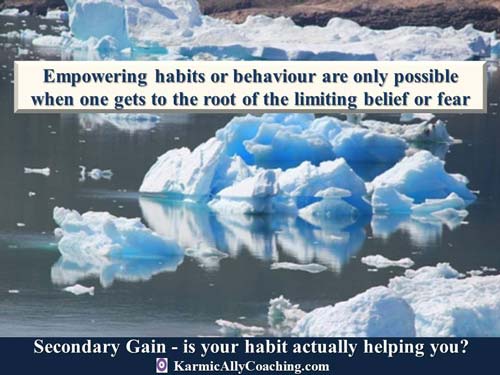
To press the button or not to press the button…… that is the question.
Nope, I haven’t gotten my Hamlet wrong. Yet I certainly had a Hamlet moment discovering a secondary gain to a habit which I am now changing.
The other day I did something quite out of character for me both as a person as well as a businessperson. I’m glad I did because I found out something new about myself which a lot of business owners who maintain an online presence and email list have also experienced.
Experiencing a secondary gain moment
Here’s what happened.
I was launching a new course on Emotional Intelligence and inviting participants for the beta run first. So, I was out promoting this course to friends, colleagues and my email subscribers.
Like any good business owner and professional, I invest in courses whenever I feel I need to develop a particular skill or gain new knowledge to pass on to my clients.
And I’ve invested and completed some really good courses on creating courses. But the promotion and marketing part was a toughie because of the way I am.
Each of these courses talked about sending emails. This included cart closing emails for people who leave things for the last minute. That felt weird for me, and I refrained.
This time I decided I really should step out of my comfort zone, and I did. The second email wasn’t so bad – I’ve done that before.
It was the 3rd email that got me in Hamlet mode.
I hummed and I hawed. Even found an excuse to take my pet friend Miss Coco for an extra walk while I waited for the course enrollment deadline.
Walking The Furry One actually helped because I got a chance to think about my resistance to sending the 3rd email. It was all drafted and just needed a gentle press on the Send Button.
I asked myself in all honesty, what do I get to not feel, not do, not experience by staying stuck?
Some good answers came up as well as some counter answers from my Intuition whom I’ll call The Voice.
I was concerned I would have tons of folk unsubscribe if they saw 3 emails because my subscribers weren’t used to it. The thought they wouldn’t enroll had not crossed my mind.
The Voice inside me told me that given the open rates (mine are actually better than industry standard) if someone missed the first or the second email, they would still see the 3rd one.
The Voice reminded me of opens and clicks that I’ve gotten whenever I’ve sent a reminder. The fact that the Biggies in the business coaching industry send emails out right till the last minute.
I’ve got those emails in my Inbox. Thanks to time differences, I often wake up to find 5, yes 5 emails telling me about how a cart is closing for these thousand-dollar programs with all the bonuses I can get with 1 click of a button and payment details.
The Voice finally told me if someone unsubscribes, bless them and let them go.
Actually, nobody unsubscribed!
Later that morning, there was a post in one of the Facebook Groups where the owner was talking about doing things that stretched us.
I mentioned getting out of my comfort zone to send that 3rd email and received encouragement. It seems I’m not the only one who finds this challenging.
I understand why I was experiencing resistance and I’ll share more about it later in this post but first, I have a question for you.
How many times have you had a habit or behavior which you knew was bad for your health, self-esteem or general well-being and you have taken active steps to break it only to fall off the wagon?
Changing ourselves can be tricky sometimes.
Handling change is not easy for everyone.
The truth about Secondary Gains
Just when we think we have successfully adopted a new, more empowering habit or behavior, the old one creeps back in.
This could quite possibly be due to the existence of a sub-conscious underlying reason, which can be called a Secondary Gain or a Pay-Off.
This underlying reason is why we continue with a certain habit or behavior even though we are consciously aware that the activity is not beneficial to us.
These habits and behaviors could include smoking, excessive shopping on your credit card, blaming others for your problems, being non-assertive or a yes person.
They all have an underlying Pay-Off Factor.
A smoker who finds it difficult to quit or manages to for a while and then goes back to the habit may make the excuse that stressful situations cause the lapse in the effort to quit the habit. Perhaps we feel more part of a peer group or accepted by others. The excuses are numerous.
Whether it is low self-esteem, lack of confidence or motivation, continual negative thinking, peer pressure – they will all have an underlying payoff factor – which may or may not be positive.

Empowering habits or behavior are only possible when one gets to the root of the limiting belief or fear.
For example, an individual who stays on in a job despite growing job dissatisfaction may believe that this is important to provide for his family.
In truth he may actually be scared of stepping out of his comfort zone and challenging himself.
Supposing he doesn’t get another job or a lower paying one?
What if he follows his desire to go into business and it fails?
We can often restrict ourselves without even realizing it.
Recognizing this limiting belief or fear, the individual could consider baby steps towards stepping out of his comfort zone.
He could ask for more challenging work or seek avenues for further learning and development in his organization. Thus, contributing to both his and the organization’s success in the long run.
He may also begin to explore and research a new career or even a business if he is so inclined.
What if there is a positive underlying factor for the individual?
For example, a person who has self-assertion issues might keep failing in his quest to become self-assertive.
He may have learnt early in life that to maintain the peace he needed to draw away attention from himself. Perhaps, it was beneficial to keep quiet when there is conflict.
This might have served the purpose of keeping away the fear of being unpopular or even being bullied. In adult life, this habit or behavior might not serve the person.
Instead, the person might do well to understand what benefit they were getting from this behavior.
See if there is a positive behavior to replace the undermining one and yet give the same results. Such as asserting neutrality in conflicts where the person is a third party. Or learning to express oneself while willing to listen to the other’s point of view openly and objectively.
By doing this, one will have made a good start at gaining a higher order of change. The more changes one makes that still satisfy the Secondary Gain, the easier it will be to change habits and behaviours.
A deeper analysis and final words on Secondary Gains
Returning to my story, a deeper analysis post pressing the button led to an amazing realization.
During my corporate world days, I had worked in the Audit and Assurance Industry. We were taught not to openly ask for the business. In those days, the governing body did not allow us to advertise explicitly.
Even when the firms did advertise, there were caveats in the advertisement. We were encouraged to invite inquiries but not blatantly say we wanted the business.
When it came to follow ups, there were those that one could do. Like following up for invoice payments. Or extra information required to complete an audit or project. And those that we could not.
I realized I was looking at that 3rd email as being unprofessional. My secondary gain was not breaking the rules of follow up. But these rules were now redundant for me!
I’ve already started practicing new habits for launches. This includes reaching out to my network like I did this time. I’m keeping up the practice of informing my list that I will remind them again. And if someone unsubscribes, so be it.
In fact, one subscriber was kind enough to write and tell me that the course was not of interest to her.
Hey, I got some engagement from a subscriber who felt she needed to let me know why she wasn’t signing up.
What about you?
Have you ever found a habit, good or bad that you wouldn’t let go off because there was a secondary gain involved?
PS: If you need more help in letting go of those awful limiting fears, then the 3 step process outlined in this post will definitely help.






 I adhere to the Certified Coaches Alliance Code of Ethics and Standards. A copy is available on request.
I adhere to the Certified Coaches Alliance Code of Ethics and Standards. A copy is available on request.
 Let's Talk through the Connect Form:
Let's Talk through the Connect Form: